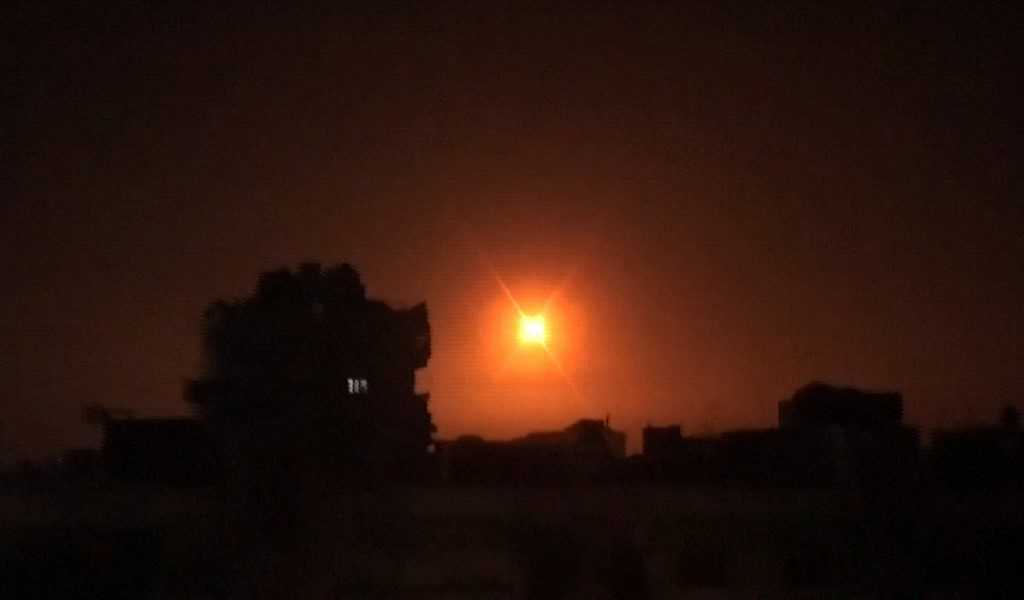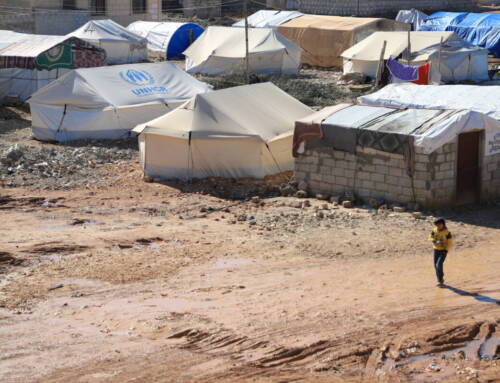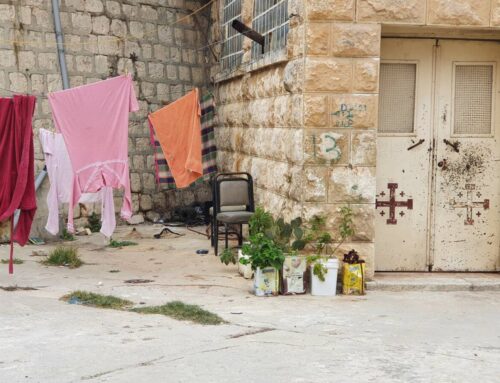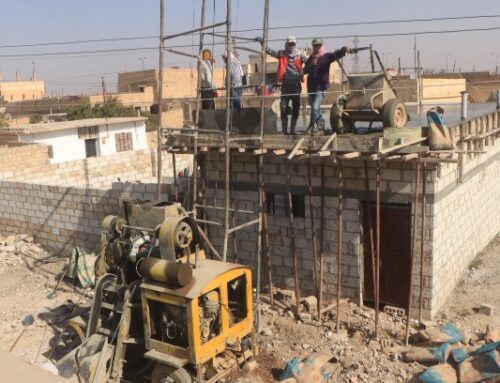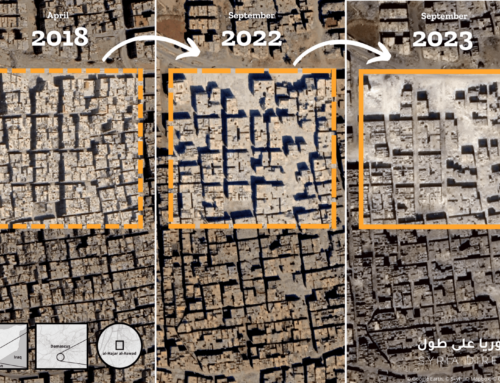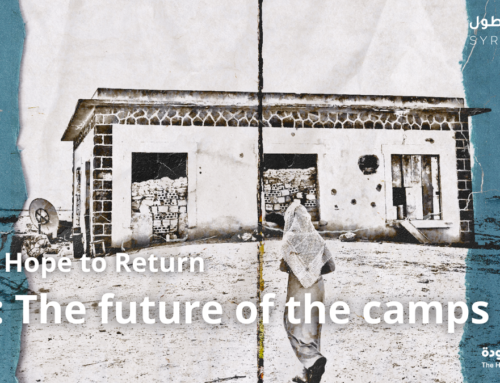‘Expelling the usurper’: Legal avenues to retake homes stolen by Hezbollah in Quneitra thwarted by security concerns
An estimated 25 houses have been illegally seized by the Iranian-backed Hezbollah militia in the “triangle of death” in southern Syria.
17 May 2021
PARIS — Three years have passed since Khaled Abdulrahman (a pseudonym) returned to his village in the area known as the “triangle of death” in southern Syria’s Quneitra province. Since returning, he has been unable to get back his home that is being occupied by a militant group affiliated with the Lebanese militia Hezbollah.
Abdulrahman’s story with the Iranian-backed Lebanese militia started in 2014 when it launched a military attack on the triangle of death area, which includes the Sultanah, Sabsaba, Maes, Deir Maker and Kafr Nasij villages. The attack ultimately led to the militia taking control of the area in February 2015, spurring Abdulrahman to flee with his family of seven to the border region near the Syrian Golan Heights, occupied by Israel since 1967.
Returning to his village in 2018 under a Russian-sponsored settlement agreement between the Syrian regime and the opposition in southern Syria, Abdulrahman found “a Hezbollah military group occupying the house and refusing to leave,” he told Syria Direct. He recalled threats from one member of the group, who told him “not to come back while pointing his weapon in my face.”
Abdulrahman’s dreams of a stable life in his home were dashed, though he had received “assurances from the Russian negotiators of a return to our villages and houses” as well as “receiving financial and technical assistance from the provincial council, under Russian auspices, to repair damages to our houses, which hasn’t happened so far,” he said.
Abdulrahman, a physical therapist, makes SYP 120,000 a month ($38 according to the exchange rate on the parallel market of SYP 3,100 to the dollar). The rent for houses in his area ranges from SYP 80,000-100,000 ($26-32). So “we live in my father’s three-room house, with my brother and his family of four.”
Ibrahim al-Jolani (a pseudonym) is going through the same ordeal. Hezbollah members refused to leave “my life’s work,” as he described his house to Syria Direct, built “stone by stone while I was working in Lebanon.”
Al-Jolani has tried to reclaim his house for years, to no avail. The fate of his home relies on the decision of “al-Haj Abu Abdullah, the Lebanese Hezbollah leader in the triangle of death area,” Hezbollah members told him. “They claim their presence in my house is related to security reasons,” as the area is close to the borders of the occupied Golan Heights.
About 25 houses have been seized by Hezbollah in the triangle of death, according to numbers Syria Direct obtained from a member of the Quneitra Central Committee. The Committee represented opposition forces in the area during negotiations with the regime in summer 2018 that led to the latter’s forces and their supporting militias taking control of southern Syria.
Destruction on top of theft
Like other affected people, Abu Hussein fell victim to Hezbollah seizing his home in the triangle of death. The house was turned into a security point for the Lebanese militia and the regime army’s Fourth Division due to its presence “in a strategic location on the outskirts of town,” he told Syria Direct.
Further, after losing his right to live in the house he had built during years of working in Saudi Arabia, Abu Hussein lost the home entirely in “an Israeli airstrike that targeted it in 2019.” Even so, Hezbollah continues to refuse to evacuate the site, claiming that “the circumstances are those of war, and I have to cooperate with them,” he added.
Hezbollah’s continued presence at the site and mobilization in a residential area “threatens dozens of other homes in the area from similar Israeli strikes,” he warned. Abu Hussein conveyed his concerns to “a high-ranking officer of the [regime’s] 90th Brigade that operates in the area.” However, the officer responded by threatening that if he repeated the request for the destroyed house, he would “take me to the Military Security branch.”
Indeed, a house in the village of Ayn al-Teenah, in the northern countryside of Quneitra, was struck by Israel on May 10, according to Syrian state news agency SANA. The continued seizure of civilian homes in Quneitra and elsewhere in Syria, and subsequent targeting by Israeli strikes, puts civilian properties in long-term and devastating danger.
In this context, Sara Kayali, a researcher at Human Rights Watch, told Syria Direct that “under international law, the one violating the rights of civilians is responsible for the damage.” She explained that “if the bombing is aimed at a civilian target, the responsibility lies with the party who carried out the attack,” while “if the target was proven to be military, nothing under international law obliges the [attacking] party to pay damages.”
However, if “the property’s confiscation is not in accordance with international law, the party that confiscated it is responsible for compensating those impacted.” This requires an independent investigation, according to Kayyali.
Expelling the usurper
Over the past few years, Abdulrahman has tried every possible way to get his seized house back from Hezbollah. He started with “the Central Committee, which showed its inability to do anything but ask the Russian Committee to intervene,” he said.
So, through the Central Committee, he submitted a claim to the Russian Committee, only to receive a response that “I have to submit a claim to the Military Security [mukhabarat] branch since the area is under its control.” However, rather than the house being cleared of Hezbollah members, “I was summoned to the office of Brigadier General Osama Zahreddin [the head of the Military Security branch in Sasa] where I was threatened with detention.”
Al-Jolani also ended up in the Military Security branch. Against the backdrop of his claims to the Quneitra Provincial Council and calling on the Central Committee to intervene, he was summoned to the branch in Sasa, in Reef Dimashq, and was warned “not to claim the house again,” he said.
After so many failed attempts by people from the triangle of death area to regain their homes, Abdulrahman sought “any legal or security justification for my house to be occupied by Hezbollah or any security service entity,” he said. He asked a friend in the security services “to search my name, [to see] if I am wanted.” But “I didn’t find any security mark on my name, nor a decision to seize my property,” meaning, he added, that “my house was seized and not confiscated by a legal action or security decision.”
According to a member of the Central Committee, “there is no way to evacuate the houses of Hezbollah members, whose presence there is justified by important security reasons due to the proximity of the area to the border with Israel.” He expressed his astonishment at the response of the Russian Central Committee, which considered “occupying houses in the triangle of death to be a matter for the Syrian army and Hezbollah.”
Syria Direct presented details of Khaled Abdulrahman and Ibrahim al-Jolani’s situations to a lawyer in Damascus, who said “recourse to the judiciary is the right path in such cases.” The homeowner must “file a lawsuit for repossession or to expel a usurper,” he said, “and explain the condition of the home and present the ownership contract.”
Since Hezbollah “is fighting in Syria within the Syrian Ministry of Defense structure,” the lawyer added, “the conflict is with the Ministry of Defense.” He indicated that “the Ministry of Defense has the right to get a decision from the court to seize the house if military necessity requires it,” adding that “the law gives preference to national security.” In that case, however, the Ministry must pay monthly rent to the homeowner.
“Even if necessity requires the seizure of the land and house, financial compensation must be paid” to the owner, added the lawyer. “An appraisal committee is formed by the court to estimate the value of the seized property.”
For his part, lawyer Hassan al-Aswad, the Secretary-General of the opposition-affiliated Syrian Council for Change, said, “the case for expelling the usurper is either civil or criminal, before the Magistrates’ Court.” In the case of affected people in the triangle of death, “there is no connection to the perpetrator’s military status, for two reasons: First, Hezbollah is not an official entity of the Lebanese army. [Second,] the act is outside the nature of military action.” Therefore, under Syrian law, “those impacted can get a [judicial] ruling, explained al-Aswad, if “the judiciary were impartial, neutral and fair.”
Although the law supports Abdulrahman to sue to “expel the usurper,” he sees this as an unlikely option. Apart from his doubts about the impartiality of the judiciary, the act of “filing a suit would leave me vulnerable to attack by Hezbollah members or arrest by the security services.”
This report was originally published in Arabic and translated into English by Mateo Nelson.

